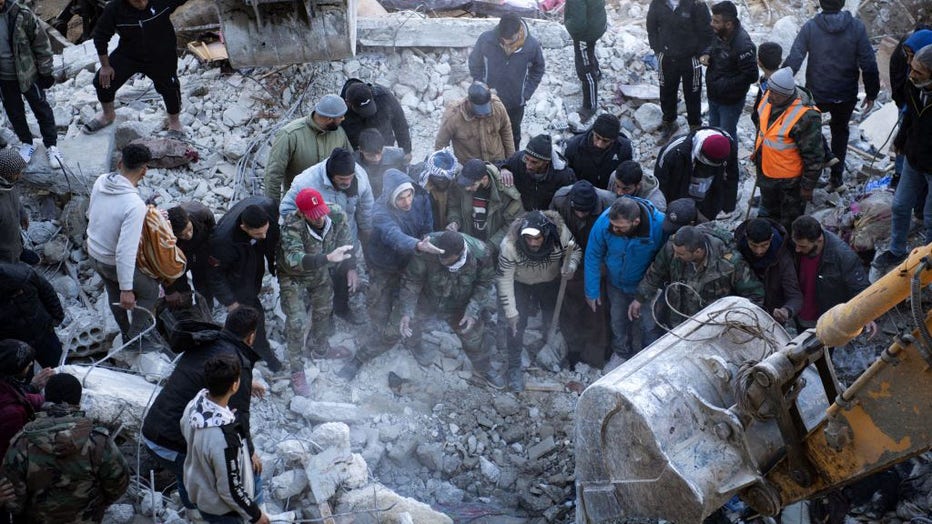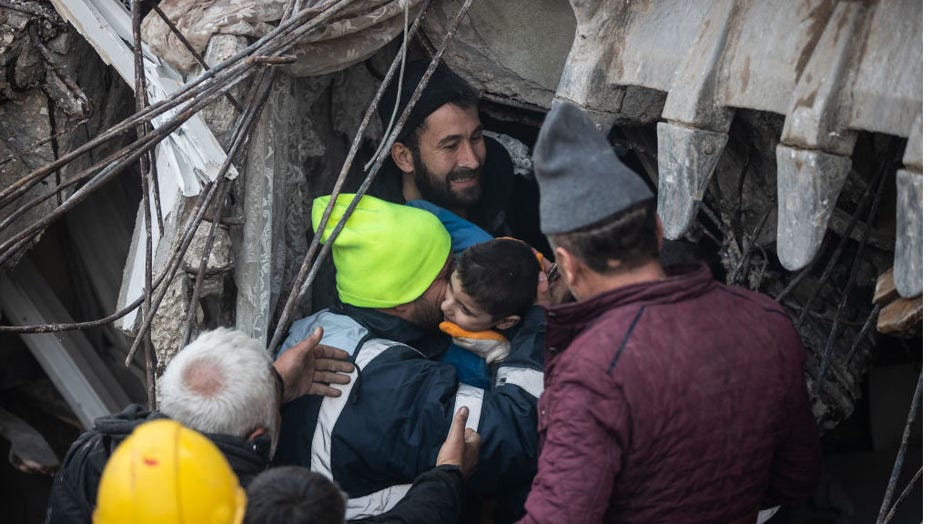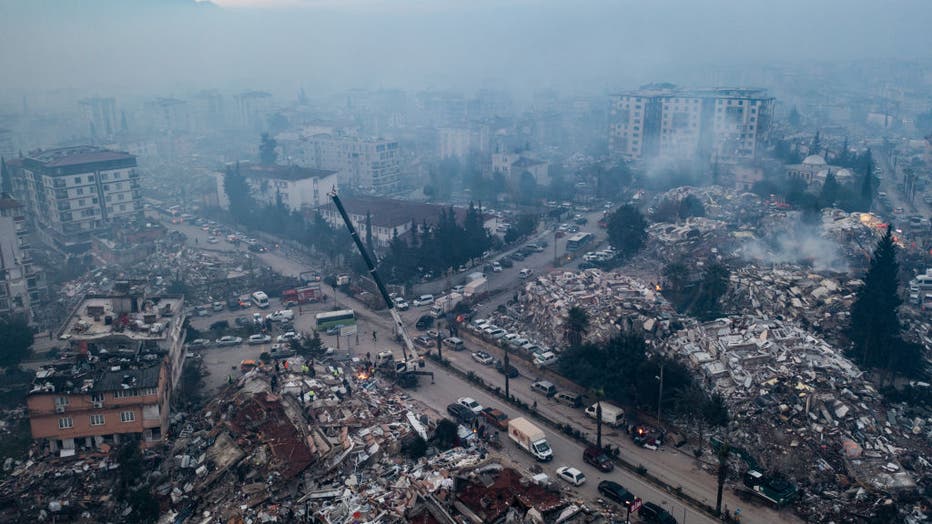Hope is fading: death toll in Turkey and earthquake in Syria tops 11,000
GAZIANTEP, Turkey – Turkey’s president on Wednesday acknowledged “shortcomings” in his country’s response to the world’s deadliest earthquake in more than a decade as hopes of new survivors emerging from the rubble of thousands of collapsed buildings faded.
As the confirmed death toll approaches 12,000, President Recep Tayyip Erdogan visited the particularly hard-hit province of Hatay, where more than 3,300 people have died and entire neighborhoods have been destroyed. Local residents have criticized the government’s efforts, saying rescuers have been slow to arrive.
Erdogan, who faces an uphill battle for re-election in May, responded to growing frustration by acknowledging problems with emergency response to Monday’s 7.8 quake, but said winter weather was a factor. The quake also destroyed the runway at Hatay Airport, further complicating the response.

CONNECTED: How to help earthquake victims in Turkey and Syria
“It is impossible to be prepared for such a catastrophe,” Erdogan said. “We will not leave any of our citizens behind.” He also responded to critics by stating that “dishonest people” are spreading “lies and slanders” about the government’s actions.
Turkish authorities said they were targeting disinformation, and an internet monitoring group said access to Twitter was restricted despite survivors using it to alert rescuers.
Meanwhile, rescuers in Turkey and Syria have been looking for signs of life in the rubble. Teams from more than two dozen countries have joined tens of thousands of local emergency services. But the scale of destruction from the earthquake and its powerful aftershocks was so great and covered such a vast territory that many people were still waiting for help.
Experts said the window of survival for those trapped under the rubble or otherwise unable to access essentials is rapidly closing. At the same time, they said it was too early to give up hope.
“The first 72 hours are considered critical,” said Stephen Godby, a disaster expert at Nottingham Trent University in England. “The average survival rate at 24 hours is 74%, after 72 hours it is 22%, and by the fifth day it is 6%.”
Rescuers sometimes used backhoes or carefully dug through the rubble. It is unclear how many people may still be trapped.
CONNECTED: Debris, rescue and hope at the epicenter of the earthquake in Turkey
In the Turkish city of Malatya, bodies were lying side by side on the ground covered in blankets as rescuers waited for cars to pick them up, according to former journalist Özel Pikal. .
Pikal, who took part in the rescue effort, said he thought at least some of the victims froze to death as the temperature dropped to minus 6 degrees Celsius (21 Fahrenheit).
“Today, there is no hope left in Malatya,” Pikal said by phone. “No one gets out alive from the rubble.”
Road closures and damage in the region made it difficult to reach all areas that need help, he said, and there were not enough rescuers where he was.
“Our hands can’t take anything because of the cold,” Pikal said. “We need working machines.”

The region has been in a civil war in Syria for more than a decade. Millions have been displaced within Syria itself, and millions more have taken refuge in Turkey.
Erdogan said the death toll in Turkey has exceeded 9,000. The Syrian Health Ministry said the death toll in government-controlled areas has topped 1,200. And at least 1,600 people have died in rebel-held northwest Syria, according to volunteer first responders known as the White Helmets.
Thus, the total number reached almost 12,000 people. Tens of thousands more are injured.
Rescue stories continued to offer hope that some trapped people might be found alive. A crying newborn, still tied by the umbilical cord to his dead mother, was rescued on Monday in Syria. In Turkish Kahramanmaras, rescuers pulled a 3-year-old boy out of the rubble, and rescuers sent by the Israeli military rescued a 2-year-old boy.
But David Alexander, professor of emergency planning and management at University College London, said evidence from past quakes suggests survival is now slim, especially for the seriously injured.
CONNECTED: Here’s a look at the world’s deadliest earthquakes since 2000.
“Statistically, today is the day we stop looking for people,” he said. “That doesn’t mean we should stop looking.”
Alexander warned that the final death toll could be unknown for weeks due to the sheer amount of debris.
The death toll from the quake has already surpassed that of Nepal’s 7.8 magnitude earthquake in 2015, which killed 8,800 people. The 2011 earthquake in Japan triggered a tsunami that killed nearly 20,000 people.
Many of those who survived this week’s earthquake lost their homes and were forced to sleep in cars, government shelters or outdoors due to rain and snowfall in some areas.
“We don’t have a tent, we don’t have a heating stove, we don’t have anything. Our children are in poor condition,” says 27-year-old Aysan Kurt. “We did not die of starvation or an earthquake, we will die freezing from the cold.”
Some families began to mourn their dead. In the Turkish city of Gaziantep, relatives who rushed to Kahramanmaras to rescue 21-year-old Mustafa Sonmez buried him on Wednesday instead.
“May the Lord have mercy on the dead. I wish patience to those who survived,” Mustafa Kaymaz, a relative, said.

The disaster comes at a difficult time for Erdogan, who is facing an economic downturn and high inflation. The perception that his government has handled the crisis poorly could hurt his reputation. He said the government would provide 10,000 Turkish liras ($532) to affected families.
Opposition leader Kemal Kilicdaroglu blamed Erdogan’s two-decade rule for the devastation, saying he had not prepared the country for disaster and accusing him of misappropriation of funds.
In an attempt to crack down on misinformation related to the earthquake response, police said they detained 18 people and identified more than 200 social media accounts suspected of “spreading fear and panic.”
Global internet monitor NetBlocks said several ISPs have restricted access to Twitter in Turkey. Some trapped survivors have used Twitter to warn rescuers and loved ones, while others have used it to criticize the government’s response.
Turkey’s official Anadolu news agency reported that a government official held a video conference with a Twitter representative to remind him of the company’s responsibility for spreading disinformation and obligations under a strict new social media law.
Twitter CEO Elon Musk tweeted that the company was “reaching out to find out more” and was later informed by the Turkish government that access would be restored soon.
Musk did not explain why Turkey restricted access in the first place.
The government periodically restricted access to social media during national emergencies and terrorist attacks, citing national security.
In Syria, relief efforts are hampered by the ongoing war and the isolation of the rebel-held region along the border, surrounded by Russian-backed government forces. Syria itself is an international pariah under Western war-related sanctions.
Ahmad Idris, a Syrian who now lives in Sarakib after the war, wept in agony as he looked at the bodies of 25 family members.
“We came here to find a safe haven for us and our children,” he said. “But in the end, look how fate overtook us here.”
___
Alsayed reports from Bab al-Hawa, Syria. Frazier reported from Ankara, Turkey. Bilginsoy reports from Istanbul. Associated Press journalists David Rising in Bangkok, Danika Kirka in London, Frank Jordans in Berlin, Robert Badendik in Istanbul, and Karim Chehaieb and Bassem Mrow in Beirut contributed.
Dallas Press News – Latest News:
Dallas Local News || Fort Worth Local News | Texas State News || Crime and Safety News || National news || Business News || Health News
texasstandard.news contributed to this report.










